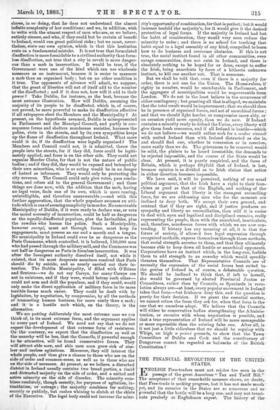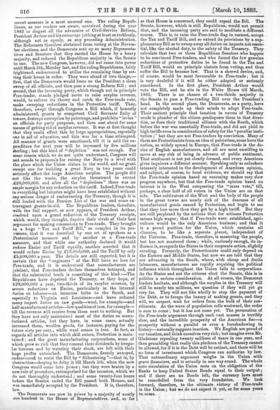THE FINANCIAL REVOLUTION IN THE UNITED' STATES.
-ENGLISH Free-traders must not rejoice too soon in the
passage of the great American Tax and Tariff Bill." The acceptance of that remarkable measure shows, no doubt, that Free-trade is making progress, but it has not made much yet, and its enemies in the States are so numerous and so powerful that the battle will be a long one, and may not termi- nate precisely as Englishmen expeet. The history of the recent measure is a most unusual one. The ruling Repub- licans, as our readers are aware, contrived during the year 1882 to disgust all the advocates of Civil-Service Reform, President Arthur and his entourage jobbing at least as recklessly, although not as openly, as any preceding Administration. The Reformers therefore abstained from voting at the Novem- ber elections, and the Democrats sent up so many Representa- tives and Senators that they carried the House by a heavy majority, and reduced the Republican majority in the Senate to one. The new Congress, however, did not come into power until March 5th, Monday last, and the ruling Republicans, fairly frightened, endeavoured to utilise the remaining time by set- ting their house in order. They were afraid of two things,— first, that the Democrats would force on the President a clean sweep of all officials, and then pass a strong Reform Bill ; and second, that the incoming party, which though not in principle Free-trader, stands pledged never to raise surplus revenue, would, to enforce its theory and catch the Free-trade vote, make sweeping reductions in the Protective tariff. They, therefore, swept through Congress a Bill which, if honestly administered, grants to competent Civil Servants fixity of tenure, destroys corruption by patronage, and prohibits " levies " on officials for party purposes, and then cast about for some means of getting rid of surplus revenue. It was at first thought that they could effect this by large appropriations, especially one in aid of education, and this was for a time attempted. All manner of grants were sanctioned, till it is said the ex- penditure for next year will be increased by five millions sterling ; but this kind of "depletion was not enough. For some reason which we do not quite understand, Congress will not accede to proposals for raising the Navy to a level with the place which the Union claims in the world, and no grant except one for building a great Navy in two years could seriously affect the large American surplus. The people did not - like the waste, the surplus threatened to exceed £28,000,000, and after all the "depletions" there was an ample margin for any reduction on the tariff. Indeed,Free-trade in everything but luxuries might have been established without any serious danger of embarrassing the Treasury, though it is still loaded with the Pension List of the war and some ex- travagant grants-in-aid. The Republican leaders, therefore, with the full support, as now appears, of President Arthur, resolved upon a grand reduction of the Treasury receipts, which would, they thought, deprive their rivals of their best argument for making concessions to Free-trade. They brought in a huge "Tax and Tariff Bill," so complex in its pro- visions, that it was described by one set of speakers as a Protectionist measure and by another as a Free-trade measure, and that while one authority declared it would reduce Excise and Tariff equally, another asserted that it would reduce Excise by £13,000,000, and the Tariff by only .£5,000,000 a year. The details are still expected, but it is certain that the " engineers " of the Bill have no love for Free-trade, and it is understood that manufacturers are jubilant, that Free-traders declare themselves betrayed, and that the substantial truth is something of this kind :—The Republicans have deprived the Treasury, as they hope, of I:20,000,000 a year, two-thirds of its surplus revenue, by severe reductions on Excise, particularly in the internal duties on tobacco—an immense bribe to the South, and especially to Virginia and Louisiana—and have reduced
many import duties on raw goods—wool, for example—and half-manufactured articles—low qualities of iron, for example—
till the revenue will receive from them next to nothing. But they have not only maintained most of the duties on manu- factured articles, but they have, in some cases, actually increased them, woollen goods, for instance, paying for the future sixty per cent., while wool comes in free. In fact, as regards all articles into which skill enters, Protection is main- tained; and the great manufacturing corporations, some of which grow so rich that they conceal their dividends by irregu- lar bonuses and by watering their stock, are left with their huge profits untouched. The Democrats, fiercely annoyed, endeavoured to resist the Bill by " filibustering "—that is, by obstruction—hoping to delay it till March 5th, when the new Congress would come into power ; but they were beaten by a new rule of procedure, extemporised for the occasion, which we do not thoroughly understand ; and some twenty-four hours before the Session ended the Bill passed both Houses, and was immediately accepted by the President. It is, therefore, law.
The Democrats are now in power by a majority of nearly one hundred in the House of Representatives, and, so far as that House is concerned, they could repeal the Bill. The Senate, however, which is still Republican, would not permit that, and the incoming party are said to meditate a different course. This is, to raise the Free-trade flag in earnest, accept the Tax and Tariff Bill, and so extend its provisions by a sup- plementary Bill as to sweep away all duties on imports not essen- tial, like the alcohol duty, to the safety of the Treasury. They calculate that two or three Republican Senators who happen to be convinced Free-traders, and who forced the few genuine reductions of protective duties to be found in the Tax and Tariff Bill, would on principle abstain from voting, and thus suffer the Bill to become law. That is a shrewd device, and, of course, would be most favourable to Free-trade ; but it is very doubtful if it will be either adopted or seriously
considered. In the first place, President Arthur would veto the Bill, and he sits in the White House till March, 1885. There is no chance of a two-thirds majority in the Senate to pass a Free-trading Bill over the President's head. In the second place, the Democrats, as a party, have not completely made up their minds to adopt Free-trade. Their ancient principle that taxation in excess of Treasury needs is plunder of the citizen predisposes them in that direc- tion, as does their traditional alliance with the South, which before the war was essentially Free-trade, and did not yield to high tariffs even in consideration of safety for the "peculiar insti- tution ;" but they are not Free-traders by conviction. Many of them are Protectionists from an idea of patriotism, some have the notion, so widely spread in Europe, that Free-trade is the de- vice of English manufacturers, and all are most unwilling to move at any risk of being in advance of public sentiment. That sentiment is not yet clearly formed, and every American gives inquirers a different account. Speaking only as onlookers intensely interested in the development of American opinion, and subject, of course, to local evidence, we should say that the Free-trade opinion based on reasoning makes very slow progress anywhere, but that the Free-trade opinion based on interest is in the West conquering the "mass vote," till, perhaps, a clear half of all voters in the Union are on that side. The cultivators of the West and the body of the people in the great towns are nearly sick of the dearness of all manufactured goods caused by Protection, and begin to see that they lose more than they get by a high tariff. But they are still perplexed by the notions that for artisans Protection means high wages ; that if Free-trade were established, agri- culture would be the only American business; and that it is a proud position for the Union, which contains all climates, to be like a separate planet, independent of the Universe. Free-trade, therefore, is mastering the people, but has not mastered them ; while, curiously enough, its in- fluence is, as regards the States in their corporate action, slightly
receding. Formerly, the Protectionists could only depend on the Eastern and Middle States, but now we are told that they are advancing in the South, where, with cheap and docile labourers, manufacturers are rapidly acquiring the political influence which throughout the Union falls to corporations.
As the States and not the citizens elect the Senate, this is in politics a serious consideration. At all events, the Democrat leaders hesitate, and although the surplus in the Treasury will still be nearly ten millions, we question if they will yet go very far. They will not like wholly to stop the payment of the Debt, or to forego the luxury, of making grants, and they will, we suspect, wait for orders from the bulk of their con- stituents. As the wave of population rolls westward, the order is sure to come ; but it has not come yet. The permeation of the Free-trade argument through such vast masses is terribly slow, and the incredible prosperity of the American fisc—a prosperity without a parallel or even a foreshadowing in history—naturally suggests inaction. We English are proud of our taxation, and think ourselves very rich; but imagine even Mr. Gladstone repealing twenty millions of taxes in one year, and then grumbling that really this plethora of the Treasury cannot be allowed, for if it is the Debt will be extinct, and there will be no form of investment which Congress can authorise by law.
That extraordinary argument weighs in the Union with grave financiers, and is actually in one way sound. The whole note circulation of the Union rests on the obligation of the Banks to keep United States Bonds equal to their output ; and if there are no Bonds left, the currency laws must be remodelled from the very foundation. We look forward, therefore, to the ultimate victory of Free-trade in the Union ; but we do not expect it yet, or for some years to come.



































 Previous page
Previous page